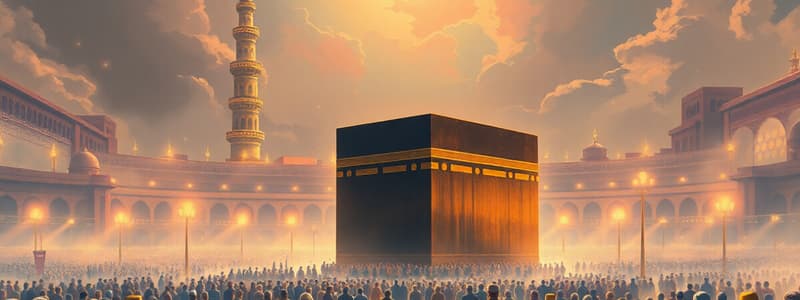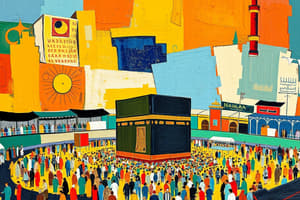Podcast
Questions and Answers
Describe the significance of the Ka'aba in Makkah for Muslims performing Hajj and how it is reflected in the actions they perform there.
Describe the significance of the Ka'aba in Makkah for Muslims performing Hajj and how it is reflected in the actions they perform there.
The Ka'aba is the holiest place in Islam and symbolizes the unity of God. Pilgrims circumambulate the Ka'aba seven times, signifying their devotion to God and their commitment to the oneness of God. They also touch the Black Stone, which is said to be a meteorite gifted by God, seeking blessings and forgiveness.
Explain the difference between 'greater jihad' and 'lesser jihad' within Islamic tradition. How does the concept of 'greater jihad' provide a framework for ethical conduct in daily life for Muslims?
Explain the difference between 'greater jihad' and 'lesser jihad' within Islamic tradition. How does the concept of 'greater jihad' provide a framework for ethical conduct in daily life for Muslims?
'Greater jihad' refers to the internal struggle against one's own negative tendencies and desires, while 'lesser jihad' refers to the external struggle against oppression and injustice. 'Greater jihad' emphasizes self-discipline, patience, and moral uprightness, and guides Muslims to overcome their weaknesses and strive for moral perfection, even in the face of adversity.
What is the significance of Id-ul-Adha for Muslims today in Great Britain? How does it demonstrate the importance of community and sacrifice within Islam?
What is the significance of Id-ul-Adha for Muslims today in Great Britain? How does it demonstrate the importance of community and sacrifice within Islam?
Id-ul-Adha commemorates Prophet Ibrahim's willingness to sacrifice his son Ismail, demonstrating the ultimate act of submission to God. It emphasizes the importance of community by sharing the sacrifice of an animal and distributing the meat amongst family, friends, and the less fortunate. This celebration fosters a sense of unity and strengthens bonds within the Muslim community.
Explain the role of 'family' within the Islamic tradition. How does the concept of 'family' extend beyond just biological kinship to encompass the wider community?
Explain the role of 'family' within the Islamic tradition. How does the concept of 'family' extend beyond just biological kinship to encompass the wider community?
Discuss the relevance of 'Ashura' for Muslims in Great Britain today. How does this commemoration reflect the themes of sacrifice, remembrance, and repentance within Islam?
Discuss the relevance of 'Ashura' for Muslims in Great Britain today. How does this commemoration reflect the themes of sacrifice, remembrance, and repentance within Islam?
Explain the concept of Tawhid within Islam and provide one key verse from the Qur'an that demonstrates this belief.
Explain the concept of Tawhid within Islam and provide one key verse from the Qur'an that demonstrates this belief.
Describe the relationship between predestination and human freedom in Islamic thought. How do these concepts influence the idea of individual responsibility and the Day of Judgement?
Describe the relationship between predestination and human freedom in Islamic thought. How do these concepts influence the idea of individual responsibility and the Day of Judgement?
Compare and contrast the six articles of faith in Sunni Islam and the five roots of Usul ad-Din in Shia Islam. What are some key similarities and differences between these two branches of Islam on these foundational beliefs?
Compare and contrast the six articles of faith in Sunni Islam and the five roots of Usul ad-Din in Shia Islam. What are some key similarities and differences between these two branches of Islam on these foundational beliefs?
What is the significance of the Qur'an in Islamic faith? Discuss its role as a revelation, its authority, and its relationship to other holy books of Abrahamic faiths.
What is the significance of the Qur'an in Islamic faith? Discuss its role as a revelation, its authority, and its relationship to other holy books of Abrahamic faiths.
Describe the nature of angels in Islamic belief. What are their roles and why are the angels Gabriel (Jibril) and Michael (Mika'il) particularly important?
Describe the nature of angels in Islamic belief. What are their roles and why are the angels Gabriel (Jibril) and Michael (Mika'il) particularly important?
What are the five pillars of Islam, and what is their significance in the practice of faith?
What are the five pillars of Islam, and what is their significance in the practice of faith?
Explain the significance of Salah in Islamic practice. What are some key differences in the way Sunni and Shi'a Muslims perform Salah?
Explain the significance of Salah in Islamic practice. What are some key differences in the way Sunni and Shi'a Muslims perform Salah?
What are the origins and significance of Sawm (fasting) during Ramadan? Briefly describe the benefits of Sawm according to Islamic tradition.
What are the origins and significance of Sawm (fasting) during Ramadan? Briefly describe the benefits of Sawm according to Islamic tradition.
Explain the concept of Zakah in Islamic practice. How does it differ from the Shi'a concept of Khums?
Explain the concept of Zakah in Islamic practice. How does it differ from the Shi'a concept of Khums?
Describe the significance of the Night of Power (Laylat al-Qadr) during Ramadan. How does this night relate to the verses in Quran 96:1-5?
Describe the significance of the Night of Power (Laylat al-Qadr) during Ramadan. How does this night relate to the verses in Quran 96:1-5?
Flashcards
Hajj
Hajj
The pilgrimage to Makkah, a significant act of worship in Islam.
Ka'aba
Ka'aba
The sacred structure in Makkah, focal point of Hajj.
Jihad
Jihad
Struggle or effort, with greater and lesser forms in Islam.
Id-ul-Adha
Id-ul-Adha
Signup and view all the flashcards
Ashura
Ashura
Signup and view all the flashcards
Six Articles of Faith
Six Articles of Faith
Signup and view all the flashcards
Tawhid
Tawhid
Signup and view all the flashcards
Nature of God
Nature of God
Signup and view all the flashcards
Prophethood (Risalah)
Prophethood (Risalah)
Signup and view all the flashcards
Life after Death (Akhirah)
Life after Death (Akhirah)
Signup and view all the flashcards
Five Pillars of Sunni Islam
Five Pillars of Sunni Islam
Signup and view all the flashcards
Ten Obligatory Acts in Shi'a Islam
Ten Obligatory Acts in Shi'a Islam
Signup and view all the flashcards
Shahadah
Shahadah
Signup and view all the flashcards
Salah
Salah
Signup and view all the flashcards
Zakah
Zakah
Signup and view all the flashcards
Study Notes
Islam
- Hajj is the pilgrimage to Makkah, including origins, how hajj is performed, and actions pilgrims perform at sites including the Kaaba at Makkah, Mina, Arafat, Muzdalifah and their significance.
- Jihad has different understandings of meaning and significance of greater and lesser jihad; origins, influence and conditions for the declaration of jihad.
- Festivals and commemorations and their importance for Muslims in Great Britain today, including the origins and meanings of Id-ul-Adha, Id-ul-Fitr, Ashura.
Studying That Suits You
Use AI to generate personalized quizzes and flashcards to suit your learning preferences.




